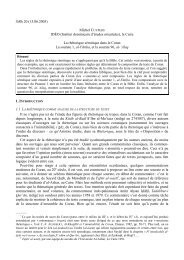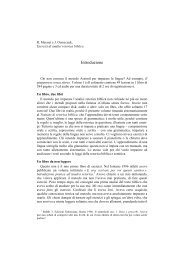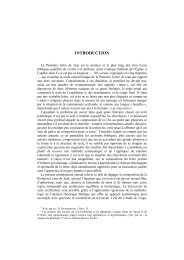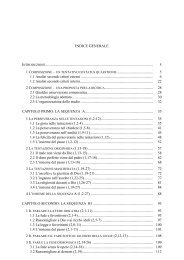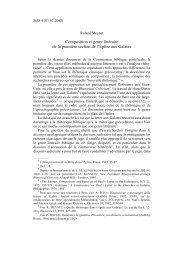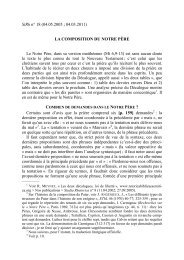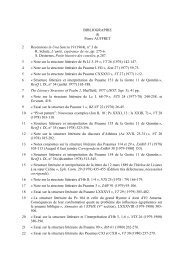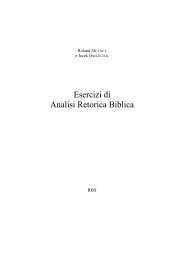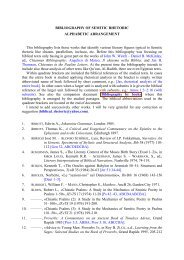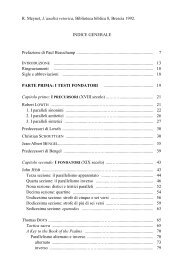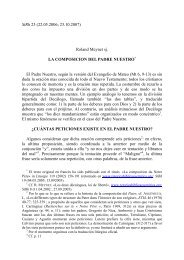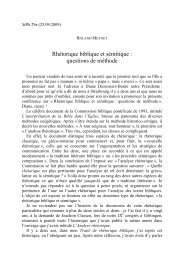15. Claude Lichtert, «La prière de Jonas - Retorica Biblica e Semitica
15. Claude Lichtert, «La prière de Jonas - Retorica Biblica e Semitica
15. Claude Lichtert, «La prière de Jonas - Retorica Biblica e Semitica
Create successful ePaper yourself
Turn your PDF publications into a flip-book with our unique Google optimized e-Paper software.
<strong>Clau<strong>de</strong></strong> LICHTERT La prière <strong>de</strong> <strong>Jonas</strong> (Jon 2) 2<br />
le renforcement <strong>de</strong> l’étu<strong>de</strong> spécifique <strong>de</strong> la prière, <strong>de</strong> plus en plus considérée comme clé<br />
<strong>de</strong> lecture <strong>de</strong> tout le livre 7 . De nombreux exégètes considèrent que la prière est partie<br />
intégrante du livre ; elle est indispensable à la compréhension <strong>de</strong> l’ensemble, bien<br />
qu’elle soit stylistiquement différente du reste 8 . Ils vont ainsi à l’encontre <strong>de</strong> l’opinion<br />
traditionnellement soutenue par la recherche historico-critique qui tient que, dans une<br />
narration biblique, les passages poétiques ne constituent pas une partie originale du<br />
texte mais sont <strong>de</strong>s additions tardives. K.A.D. Smelik développe différentes raisons<br />
tendant à expliquer le passage <strong>de</strong> la prose à la poésie dans les écrits bibliques et dans le<br />
livre <strong>de</strong> <strong>Jonas</strong> en particulier 9 .<br />
La prière <strong>de</strong> Jon 2 est le passage du livre pris plus particulièrement en compte pour<br />
l’étu<strong>de</strong> <strong>de</strong> sa structure. Il n’existe pas <strong>de</strong> consensus parmi les commentateurs, en raison<br />
<strong>de</strong> l’usage <strong>de</strong> critères fort différents et souvent non justifiés : métrique hébraïque, jeu<br />
<strong>de</strong>s assonances et <strong>de</strong>s récurrences verbales, trame narrative, critères structurels qui<br />
————<br />
van het boek Jona », KeTh 29 (1978), 285-298, 287-288 ; J.S. ACKERMAN, « Satire and Symbolism in<br />
the Song of Jonah », B. HALPERN – J.D. LEVENSON (éd.), Traditions in Transformation. Turning<br />
Points in <strong>Biblica</strong>l Faith (Winona Lake 1981), 213-246, 216.<br />
7 J.T. WALSH, « Jonah 2,3-10 : A Rhetorical Critical Study », Bib 63 (1982), 219-229 ; J.A.<br />
SOGGIN, « Il “segno di Giona” nel libro <strong>de</strong>l profeta Giona », Lateranum 48 (1982), 70-74 ; R.<br />
COUFFIGNAL, « Le Psaume <strong>de</strong> <strong>Jonas</strong> (<strong>Jonas</strong> 2,2-10). Une catabase biblique, sa structure et sa<br />
fonction », Bib 71 (1990), 542-552.<br />
8 D.L. CHRISTENSEN, « Narrative Poetics and the Interpretation of the Book of Jonah », E. R.<br />
FOLLIS (éd.), Directions in <strong>Biblica</strong>l Hebrew Poetry (JSOTS, 40 ; Sheffield 1987), 29-48, 45 ; R. DE<br />
HOOP, « The Book of Jonah as Poetry. An Analysis of Jonah 1 :1-16 », W. VAN DER MEER et AL. (éd.),<br />
The Structural Analysis of <strong>Biblica</strong>l and Canaanite Poetry (JSOTS, 74 ; Sheffield 1988), 156-171,<br />
156 ; K.M. CRAIG, Jr., « Jonah and the Reading Process », JSOT 47 (1990), 103-114, 104 ; J.-L. SKA,<br />
‘Our Fathers Have Told Us’. Introduction to the Analysis of Hebrew Narratives (SubBib, 13 ; Rome<br />
1990), 90-91 ; B.L. WOODARD, « Death in Life : The Book of Jonah and <strong>Biblica</strong>l Tragedy », GraceTJ<br />
11 (1991), 3-16, 9 ; J.W. WATTS, « Jonah’s Psalm », J.W. WATTS, Psalm and Story. Inset Hymns in<br />
Hebrew Narrative (JSOTS, 139 ; Sheffield 1992), 132-144, 133 ; J. BALDWIN, « Jonah », T.E.<br />
MCCOMISKEY (éd.), The Minor Prophets. An Exegetical and Expository Commentary, t.2 : Obadiah,<br />
Jonah, Micah, Nahum, Habakkuk Grand Rapids 1993), 543-590, 566-567 ; A. BRENNER, « Jonah’s<br />
Poem out of and within Its Context », P.R. DAVIES – D.J.A. CLINES (éd.), Among the Prophets.<br />
Language, Image and Structure in the Prophetic Writings (JSOTS, 144 ; Sheffield 1993), 183-192 ; J.<br />
LIMBURG, Jonah. A Commentary (Old Testament Library ; Londres 1993), 32 ; A. WÉNIN, « Le<br />
“psaume” du livre <strong>de</strong> <strong>Jonas</strong> », Cahier <strong>de</strong> l’École <strong>de</strong>s Sciences Philosophiques et Religieuses 14<br />
(1993), 153-170, 154 ; D.B. SANDY – R.L. GIESE, Cracking Old Testament Co<strong>de</strong>s. A Gui<strong>de</strong> to<br />
Interpreting the Literary Genres of the Old Testament (Nashville 1995), 229 ; J.W. WATTS, « Song<br />
and the Ancient Rea<strong>de</strong>r », PRS 22 (1995), 135-147, 140-147 ; R. SCHRIVER, « Jonah’s Growth in<br />
Relationship to God », BToday 34 (1996), 289-294, 290 ; A.S. VAN DER WOUDE, Amos – Obadja –<br />
Jona. Een praktische bijbelverklaring (Tekst en Toelichting ; Kampen, 1997), 129-158, 132 ; COLL.,<br />
<strong>Jonas</strong>. Un conte théologique (Cahiers Evangile. Supplément, 110 ; Paris, 1999), 6 ; P.F. LOCKWOOD,<br />
« Jonah’s Psalm : Fathoming Its Depths », LuthTJ 34 (2000), 104-1<strong>15.</strong><br />
9 K.A.D. SMELIK, « The Literary Function of Poetical Passages in <strong>Biblica</strong>l Narrative. The Case of<br />
Jonah 2 :3-10 », J. DYK (éd.), Give Ear to My Words. Psalms and other Poetry in and around the<br />
Hebrew Bible. FS N.A. van Uchelen (Kampen 1996), 147-151.



